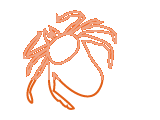Ticks – dangerous disease-carriers
50,000-100,000 infections (in Germany)
A large number of various kinds of illnesses are carried worldwide by tick bites. Lyme disease (borreliosis) is the most common tickborne disease in the USA, Europe and parts of Asia. More than 10,000 cases of disease occur annually (some sources mention 50,000 – 100,000 new infections in Germany).
Personal risk is particularly high for all people who spend time in areas favoured by ticks.
Caution in woods and fields
Particular caution is recommended especially in thin woodland (in undergrowth, at the edges of woods, in grass and on shrubs and bushes).
Ticks are brushed off by people and animals passing by depending on the stage of development:
- from grasses of up to 30 cm tall (larvae)
- from foliage of c. 1m tall (nymphs)
- from plants of up to 1.5m tall (adult ticks)
Ticks are therefore found up to a maximum of 1.5 m above the ground and do not, as is often falsely assumed, fall from trees. Ticks are also occasionally active in gardens and parks in residential areas.
Ticks prefer damp, mild weather with temperatures of between 10 °C and 20 °C, though they already become active at a ground temperature of 5-7 °C. Particularly active seasons for ticks are the transition periods and wet summers. Hot and dry summers slow down tick activity.
Prevention of tick bites
- Prevent tick bites as far as possible by wearing clothing which covers all parts of the body
- Avoid undergrowth, bushes or tall grass as far as possible
- Use insect repellents which may keep ticks away
- Every time you have been in areas with foliage shake clothes thoroughly and search them for ticks, shower and examine your body for ticks
Our Tip: Wear light clothes for preference, as you can more easily see any ticks you have picked up!
Diseases caused by tick bites
» Borreliosis
Borreliosis (known as Lyme disease in the USA) is caused by the transmission of bacteria. Risk of infection with the pathogens of the infectious disease "borreliosis" exists practically all over Germany, as about every fifth to tenth tick is contaminated with these bacteria.
A typical symptom (but not in all borreliosis patients) is so-called Erythrema migrans (also called migrating redness). This ring-shaped skin reddening is observed for a few days to weeks after a tick bite around the site of the puncture and also at other sites on the body.
The early stage of becoming ill with borreliosis also shows symptoms such as feeling unwell and fever (similar to a flu infection). The disease may lead at a later stage to meningitis, heart problems and facial paralysis (facialis paresis). At the long-term stage the following may occur:
- Inflammation of the joints (arthritits)
- Skin diseases (greaseproof paper skin = acrodermatitis chronica atrophicans)
Protection by inoculation is not yet possible!
Treatment by administering high doses of antibiotics in good time is possible.
» TBE
The tick bite disease TBE (early summer meningoencephalitis) is caused by viruses carried by ticks. There is risk of infection in particular in regions of South Germany, Austria and Switzerland. It can be assumed that about every 100th tick is infected.
In a first phase the illness begins with fever, head and limb pains (similar to summer flu). In most cases the infection is already over by this time.
However, the virus can also attack the central nervous system resulting in meningitis which may be cured without any long-term damage. In an infection which goes badly not only the meninges, but the entire brain (meningoencephalitis) may be affected by the disease and it may result in impairment of consciousness, speech and swallowing, symptoms of paralysis and psychic changes.
By comparison with borreliosis TBE occurs rarely and in Germany confined to certain areas only (c. 500 infections a year and only a few end in the feared long-term damage).
Protection by inoculation is possible for this disease.
Treatment of the disease is not possible; only the symptoms can be treated.
A differential diagnosis must be made, as the courses of the two illnesses are similar!
» Other illnesses which can be carried by ticks
Various kinds of spotted fevers are also carried by ticks (particularly in the Mediterranean) Symptoms are high fever and a skin rash.
A disease known as erlichiosis, which is caused by bacteria (ehrlichiae), occurs mainly in the south of the USA and only rarely in Europe. There may be fever, head and muscle pains, but the infection often runs its course without symptoms.


